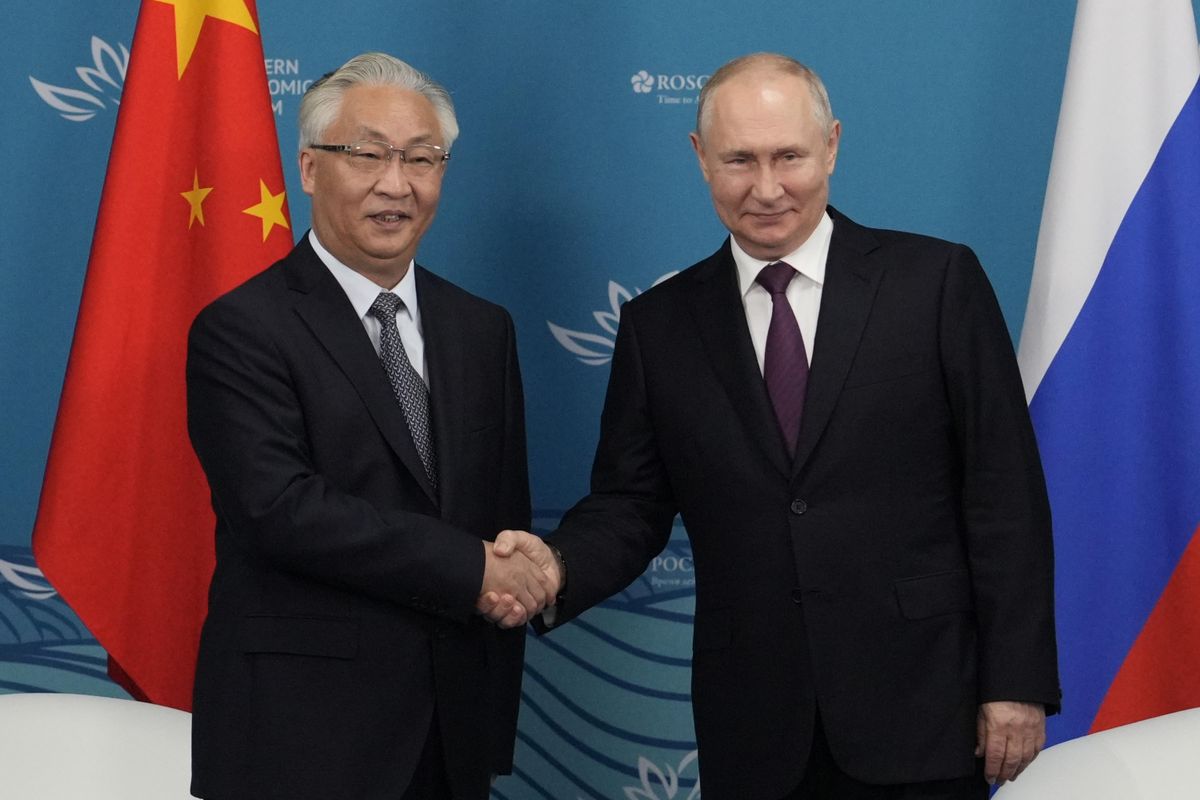China and Russia Reaffirm Cooperation and Sign Grain Deals at Vladivostok Forum

The Lede: A group of Chinese and Russian firms signed multiple agreements on Monday to guarantee the passage of Russian grain to China at the Eastern Economic Forum in Vladivostok where Russian President Vladimir Putin met with Chinese Vice Premier Zhang Guoqing.
What We Know:
- The New Land Grain Corridor comprises a group of companies managing the development of grain production and infrastructure in Russia's Ural Mountains, Siberia, and the country’s Far East. The entity will partner with the state-backed China Chengtong International Investment to create a grain logistics hub at the border called the "Grain Terminal Nizhneleninskoye-Tongjiang" located between Vladivostok and China's northeastern province of Heilongjiang. Total investment for the project is expected to reach $159 million. The affiliated Trans-Baikal Grain Terminal also secured a contract with China's Guangdong BestCon Intelligent Equipment firm.
- Russia's EPT Production and Export Company also signed two contracts on Monday for the production and supply of grains, legumes, and oilseeds with the Chinese trading company Noble Home and the Chinese transport and logistics company Trans Eurasia International Logistics.
- Russia’s Legendagro agricultural firm also said at a forum panel on Monday that China is open to importing soybeans, corn, barley, wheat, meat, and dairy products from Russia.
The Background: The Eastern Economic Forum is an annual event held in Vladivistok that curates business events covering trade, investment, infrastructure, energy, tourism, education, and culture between Russia’s Far East and the Asia-Pacific region. Following Russia’s invasion of Ukraine, Beijing declared “no limits” to its friendship with Moscow. In light of Western economic and financial sanctions, Russia has been increasingly using the yuan for international invoicing and cross-border payments.
Likely Outcomes:
- Agriculture will move alongside China’s role as an outlet for Russian oil and gas and other natural resources as Western sanctions persist. China’s financial system will also continue to provide an infrastructure for Russia to make international transactions through its markets and its currency. Beijing may also try to negotiate a way for Ukraine to deliver its agricultural goods, although the deals with Russia are likely its priority.
- As the U.S. and its Western allies have already placed curbs on other sectors of China’s market for a variety of reasons, it could be possible that goods of Russian origin that pass through China could be targeted at some point in the future. However, this would likely be difficult to enforce as it has been observed in the case of Russian oil.
- It is likely in China’s interest to foster good relations with Russia while upholding the image of being a mediator in the Russia-Ukraine War in order to make deals like this one. This allows Beijing to accrue the benefits as global economic trends shift around Moscow as the war continues. Closer relations with Russia also open the door for larger opportunities in BRICS and the Shanghai Cooperation Organization (SCO) that loop in other countries.
Quotables:
“Relations between Russia and China in the sphere of economic cooperation have reached a very high level. Of course, this is all a derivative of what has been achieved in the political sphere. But nevertheless the results are more than good, they are excellent.” – Vladimir Putin, President of Russia
“China is willing to work with Russia to implement the important consensus reached by the two heads of state, share development opportunities, deepen mutually beneficial cooperation, strengthen coordination and synergy of regional development strategies, give full play to the role of local cooperation mechanisms between the two countries, so as to promote the continuous development of China-Russia cooperation to achieve new results.” – Zhang Guoqing, Vice Premier of China
"Even though China is very dependent on imports of grain [from Ukraine], it puts more importance on geopolitical and national security considerations.” – Willy Wo-Lap Lam, senior fellow at the Jamestown Foundation
"China doesn't want to spend political capital and join a pressure campaign against Moscow that is unlikely to have results. China also knows that its losses are compensated by imports of agricultural products from elsewhere, including Russia, that [Russia] has another good harvest this year and is increasing exports.” – Alexander Gabuev, director of the Carnegie Russia Eurasia Center
Good Reads:
China, Russia agree to build huge grain hub at border to facilitate trade, enhance food security (SCMP)
Putin lauds ‘excellent’ economic ties with China. Here’s how they’ve grown (CNN)
China not expected to push Russian return to Black Sea grain deal (Nikkei)
